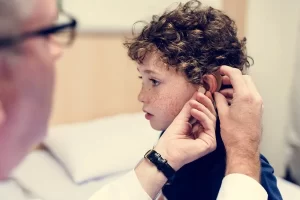
We know how important your children are to you and how you want what’s best for them. We also understand that it can be tricky to keep track of all the check-ups, appointments, and vaccinations they need. Let’s talk about when they need to have their hearing checked and what you should be looking for as a parent.
Hearing loss can occur as a birth defect, and happens in as many as every 1 in 1,000 babies born. Causes range from being premature, staying in the Neonatal Intensive Care Unit (NICU), having jaundice and needing a blood transfusion, and other birth complications. Hearing loss at birth can also be hereditary. Your newborn will receive a hearing screening at birth. This screening should identify any hearing loss. However, trauma, infections, and other problems can lead to hearing loss in later childhood. In fact, many researchers say that the number of individuals suffering from hearing loss can double between childhood and the teen years. That means it’s crucial that you have your child’s hearing regularly checked. If treatment is started before 6 months, it can be very effective.
If your child doesn’t show any signs of hearing loss, regular screenings are still required. They should have their hearing screened at normal check-ups with the family doctor. Hearing screenings are usually scheduled at ages 4, 5, 6, 8, and 10. However, if you begin to suspect something out of the norm is happening, you should have your child’s hearing checked immediately.
There are signs of hearing loss that may help you determine that your child is experiencing some issues. Infants should startle when they hear loud noises. At 3 months, they usually recognize their parents’ voices, and at 6 months they look in the direction of sounds. If your child hasn’t reached these milestones, it may be cause for concern. As a toddler, if your child doesn’t speak much, appears inattentive, doesn’t respond to speech or responds inappropriately, or becomes frustrated by background noise, they may be experiencing some problems due to hearing loss.
If you have concerns about your child, or it’s time for a regular screening, please get in touch with us.